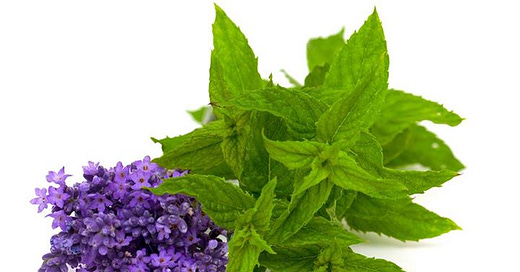If you’ve been following my column for a while, you will know for sure: I am a Science Geek. I love exploring articles, books, and websites to find new research which adds to my knowledge and understanding of essential oils. As I read the articles, it confirms that there is intelligence in nature, and it is visible! This noticeable intelligence rouses feelings of wonder and awe and reveals evidence of our divine creator.
These days, research continues at such a rapid pace, it is hard to keep up with all the new scientific discoveries. And even when we try, the language of science is not always easy to discern what it means to you and me.
Good news is that one of my superhero skills (hey, we all have them!) is to take information which may be complex and translate it into easy-to-understand conclusions.
Here are a few examples.
Peppermint
Citation: Exercise causes metabolic alterations such as the release of pro-inflammatory cytokines, increased oxidative stress, and the accumulation of metabolites (lactic acid, or lactate dehydrogenase), which leads to muscle fatigue. Previous research showed that peppermint essential oil limits these metabolic alterations to improve exercise performance. Repeated inhalation of peppermint essential oil (16 mcL/hour for two weeks) significantly delayed time to exhaustion in exercise-trained subjects. Interestingly, subjects exposed to the same levels of peppermint that did not exercise regularly did not receive the same benefits, suggesting that the activity of peppermint is not primarily ergogenic but rather reinforces the effects of exercise training to increase physical performance.
Link: https://www.ncbi.nlm.nih.gov/pmc/articles/PMC10254935
What it means: Peppermint improves exercise performance by delaying how quickly you might feel exhausted! Just breathe it in!
Lemongrass
Citation: Molecular docking research evaluates the potential of substances to bind to receptors and proteins and trigger biological activity. Recently, scientists evaluated the binding potential of constituents of lemongrass (C. citratus) essential oil in the central nervous system.
What the researchers found was that neral blocks muscarinic acetylcholine receptor M1 (better than a commercial drug) and M2 (better than acetylcholine), but not M4, which suggests that it may positively affect cardiovascular activity, memory, and learning. Meanwhile, beta-pinene and myrcene block all three receptors. The binding potential of myrcene, and its potential to affect the corticosteroid pathway, suggest it may be beneficial for Alzheimer’s and schizophrenia. Interestingly, geranial and myrcene also interacted with CB1 receptors in the endocannabinoid system. Lemongrass oil also exhibited good antioxidant activity.
Link: https://www.ncbi.nlm.nih.gov/pmc/articles/PMC10297282
What it means: Lemongrass can block unwanted signals!
Thyme, Lemongrass
Citation: Pneumonia is an acute infection that causes inflammation of the lungs. It can be caused by bacteria, viruses, or fungi. Recently, nebulized antibiotics have become the preferred treatment over intravenous and oral antibiotics in Western medicine because this allows the antibiotics to enter pulmonary tissues and reduces side effects.
Knowing this, scientists evaluated essential oils as new inhalation therapeutics in a preclinical model that simulates inhaling essential oils. Inhalation of essential oil vapors evenly distributes active substances to both the lower and upper respiratory tract. And many essential oils have anti-inflammatory and antimicrobial activity. When testing Indian medicinal plants against pneumonia-causing pathogens, ajowan CT thymol displayed the strongest antibacterial activity against H. influenzae when in vapor phase. Ajowan and lemongrass (C. citratus) were effective against all pathogens tested (H. influenzae, S, aureus, S. pneumoniae, S. pyogenes).
If you have a respiratory tract infection, inhalation is a must for your recovery.
Link: https://www.ncbi.nlm.nih.gov/pmc/articles/PMC10304056/
What it means: Inhale Thyme and Lemongrass to enjoy antibacterial activity against respiratory tract infections.
Oils for Stress
Citation: Researchers evaluated the psychophysiological responses of women to nine essential oils and one absolute (lavender, rosemary, rose, eucalyptus, jasmine, geranium, chamomile, clary sage, thyme, and peppermint). Participants inhaled each essential oil for 90 seconds through a glass funnel and electroencephalography, blood pressure, and pulse rate were measured before and during inhalation of the oils. The study showed that inhaling lavender, rosemary, eucalyptus, jasmine, chamomile, clary sage, and thyme oils reduced relative alpha brain power, indicating relaxation and a resting state. The ratio of alpha to high beta brain power—an indication of brain stability and relaxation—significantly increased when rosemary, jasmine, clary sage, and peppermint were inhaled. The relative low beta power—an indicator of brain activity in the absence of stress—significantly increased with lavender, rosemary, rose, and geranium. In addition, systolic blood pressure decreased after inhaling all ten aromatics, suggesting a decline in stress state. The research suggests that inhaling one or a combination of the oils can promote a relaxed state and increase resilience to stress.
Link: https://www.mdpi.com/1660-4601/19/9/5196/htm
What it means: The inhalation of these oils lowers blood pressure, promotes relaxation, and increases resilience to stress.
Clove, Eucalyptus
Citation: Klebsiella pneumoniae is a gram-negative bacteria responsible for a host of infections (UTI, pneumonia, meningitis, blood infections, skin infections, and liver abscesses). Most of these infections are healthcare acquired and occur when bacteria in the digestive tract spread to other parts of the body. A laboratory study found that clove and eucalyptus (E. globulus) inhibit the growth of K. pneumoniae, suggesting that they are viable candidates to reduce healthcare acquired infections caused by these bacteria.
Link: https://pubmed.ncbi.nlm.nih.gov/37300667/
What it means: You have powerful tools at your fingertips to reduce infections caused by bacteria!!
In gratitude: Many of these citations were brought to my attention by one of my favorite authors, Dr. Scott A. Johnson, an essential oils, health, and nutraceuticals expert.
You are invited…
You are invited to join us for our Wellness Wednesday Social on August 23, 2023 at 7pm in St. James! Join us for an evening of learning about what natural solutions can do for you in a fun, social gathering!
Play fun games
Hear inspiring stories
Taste oil infused snacks
Experience simply natural solutions
Register here for information and reminders. Even if you can't attend in person, register to receive more information!






